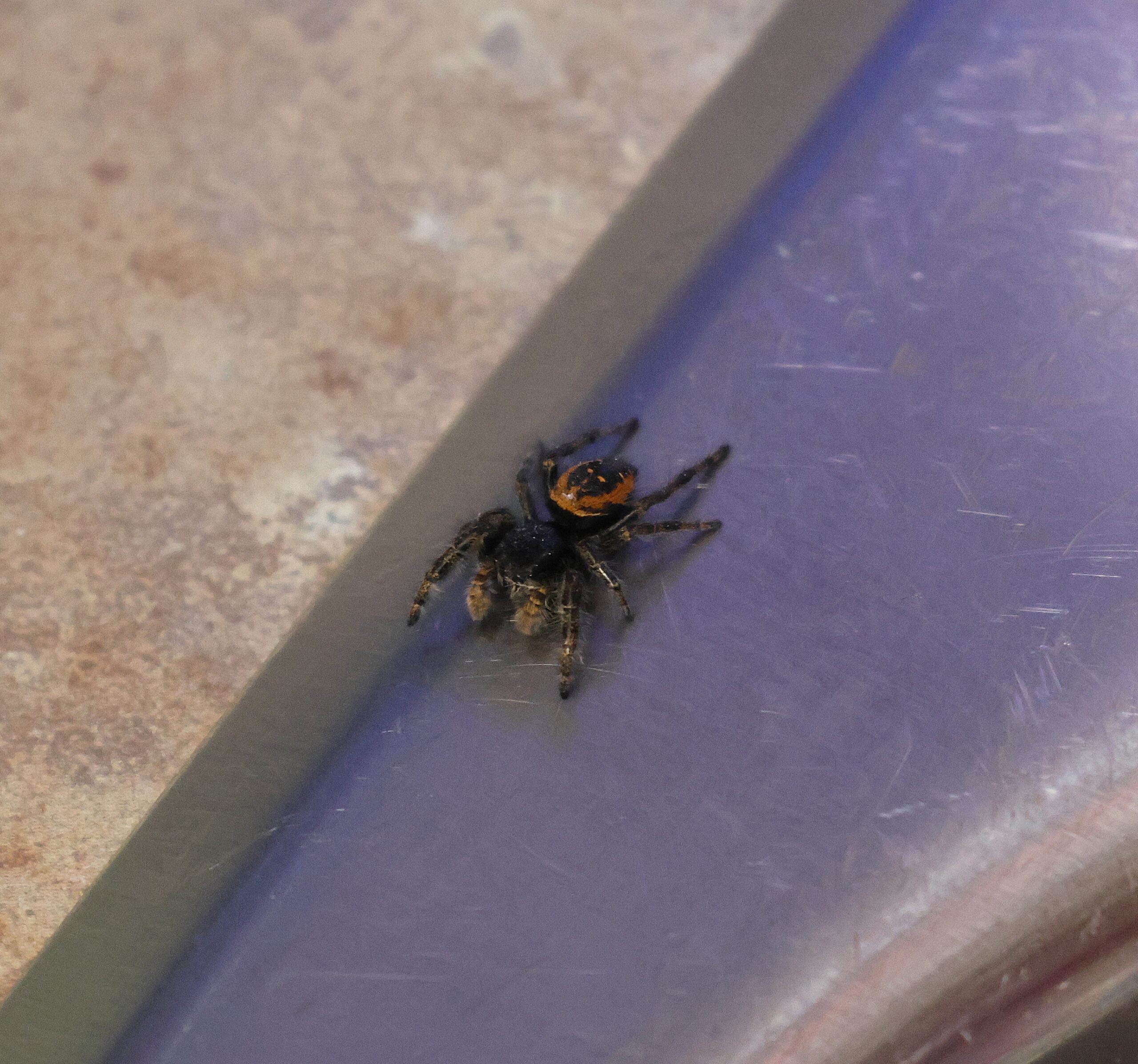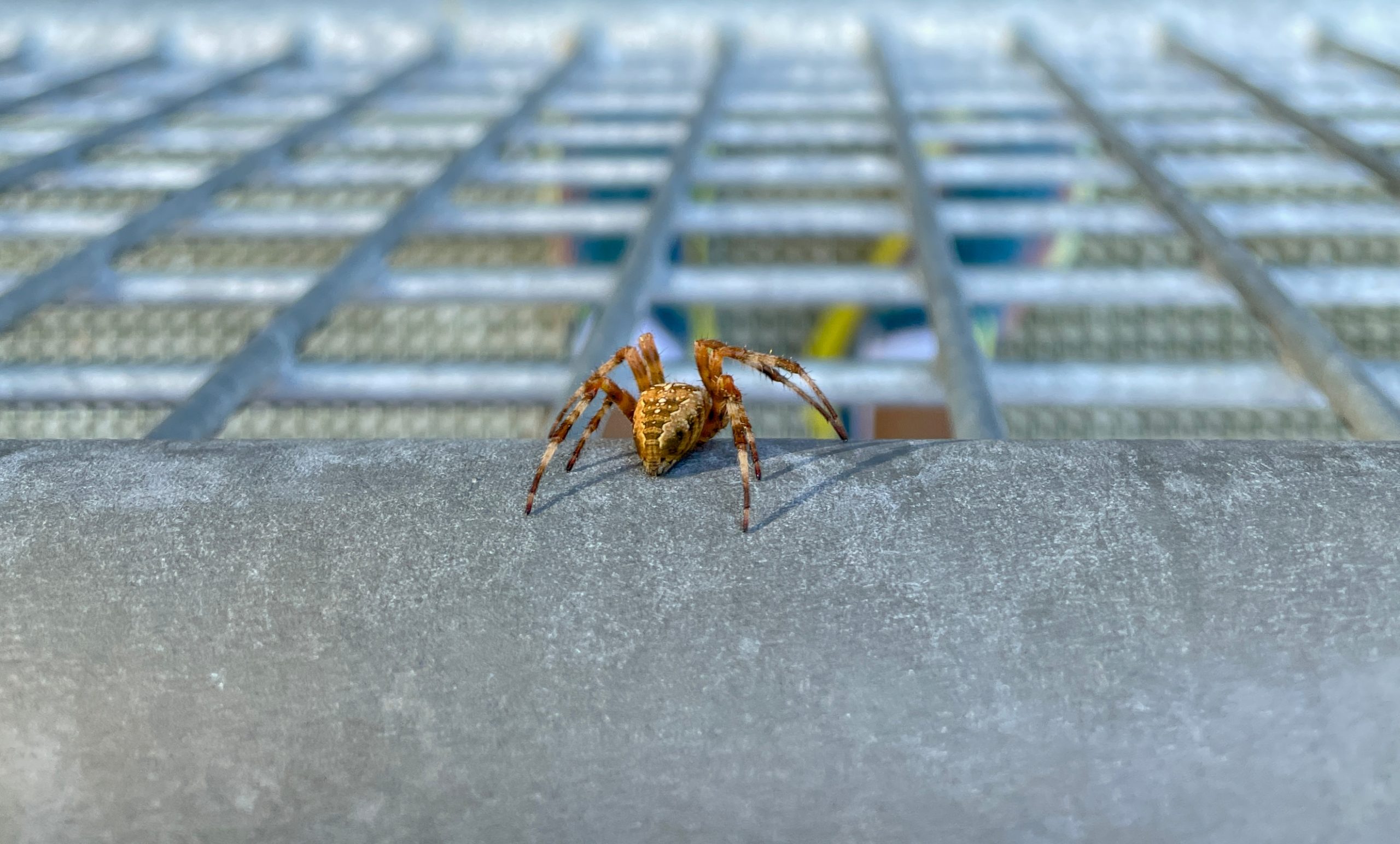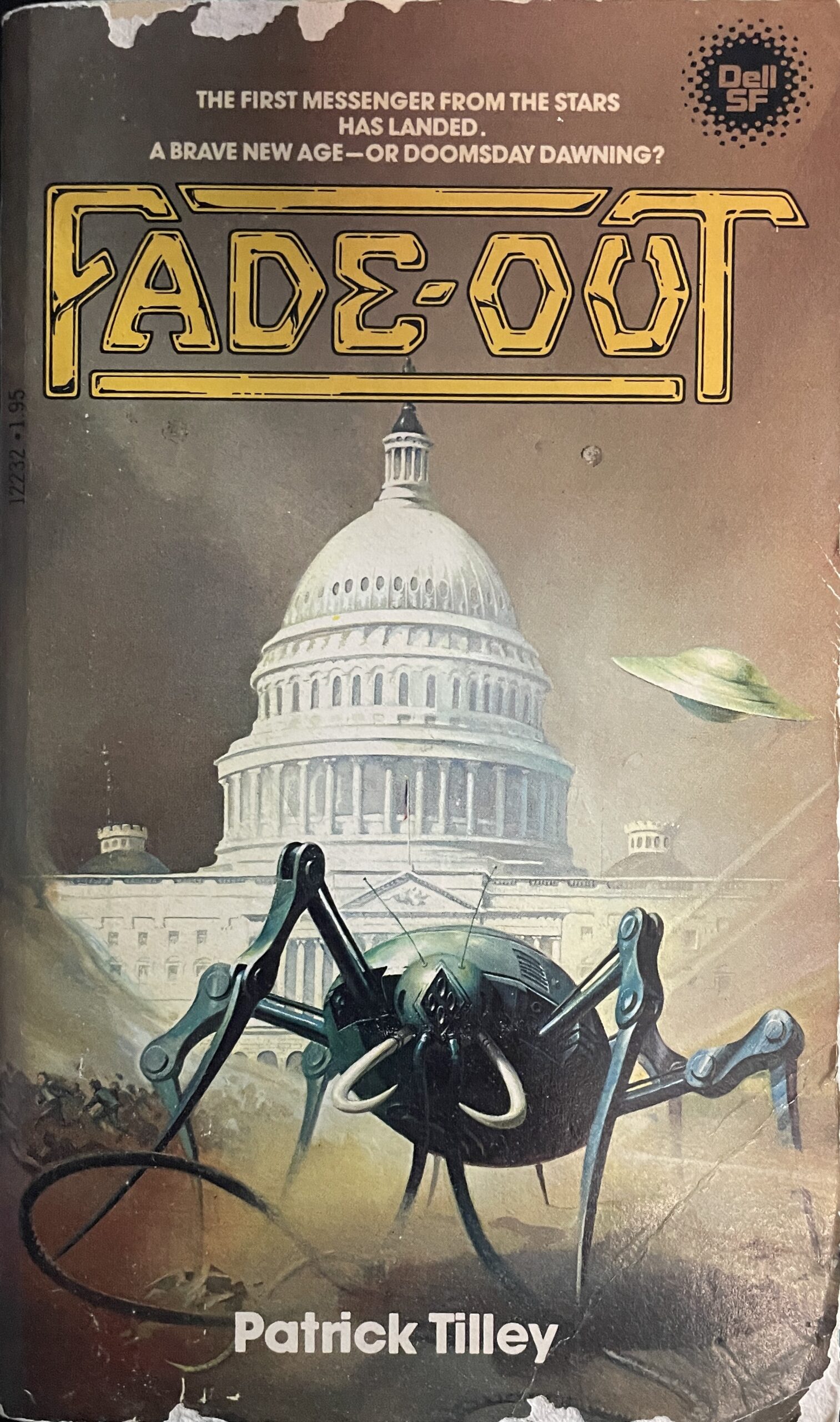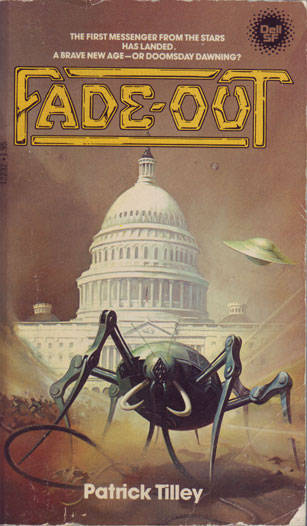Exactly what the title says. After taking its picture, the spider disappeared…somewhere.

It’s a big spider and it’s sitting inside the bowl, an inch or so above the water. Why? How? WHY?
I can’t decide whether to wait and see if it moves on its own or to gently try getting it out, knowing it will probably somehow die instantly if it accidentally touches the water.
UPDATE: The spider has been safely redirected outdoors.
Before every run at Burnaby Lake, I stand atop the Cariboo Dam in the same approximate shot and take a photo of the lake. This morning, I was starting to lean against the railing, as I do, when I looked down and spied a…spider!
I’ve cropped the resultant photo to make it maybe more artsy or something.

The outdoor friend is a very large spider hanging out on the deck, having spun a massive web at the edge of it. I first spotted the spider sitting square in the middle of it but my presence freaked him out and he retreated to a safe position off the web and above it, moving incredibly swiftly in a diagonal line. Sadly today when I checked the spider was still in his safe spot but most of the web had been obliterated, probably due to the storm that swept in earlier today. I am hoping the spider rebuilds because it’s one of the biggest I’ve seen recently.
Tub spider was just that, a large (but not outdoor friend large) spider roaming about the bathtub in the main bathroom. Since there’s no obvious way to get in the tub except via the drain (if you’re a spider, that is), I’m assuming that was where he came in from, but it was clear that even if it was he was in no hurry to return to it. He kept lapping the tub, neatly avoiding the drain each time he neared it. I decided to leave him be, thinking he would eventually give up and return to the drain.
The next day he was still skittering around the tub as before.
The day after that he was no longer skittering. He was sitting, perhaps pondering his probably terrible fate. It was then I fished him up in a glass and found him to still be very agile. I took him outside and tossed him onto the lawn, just past the massive web of his outdoor friend. I like to think he’s off happily hunting bugs now and will know to stay away from drains. I may be expecting too much.
This concludes another “I don’t step on spiders” post.
Spoilers ahead. Read at your peril!
I first read Fade-Out back in 1978 when I was an impossibly shaggy-haired 14-year-old. I read the revised edition in 1987 when I was a svelte-haired 23-year-old. And now, over two decades later I have read it a third time, as a fuzz-haired 48-year-old.
This time around I read the revised 1987 text in ebook format. The revised edition doesn’t change the story in any notable way nor does it add to its length, as most of the revisions are just updated pop culture references. Somewhat humorously, the politics remain the same, something that would have altered more drastically if author Patrick Tilley had held off for a few more years (when the Berlin Wall and Soviet Union collapsed in 1989 and 1991, respectively).
The story presents an unfolding mystery that starts with a global “fade-out” of all radar systems that lasts 22 minutes. This proves to be quite a bother, especially for airplanes, but everyone gets through it okay. Tensions between the U.S. and USSR ramp up as the Americans suspect Russian shenanigans.
When a large craft with unusual reflective properties appears in orbit, the U.S. again fear the Soviets have developed some Star Wars-style space weapons platform (before Star Wars even existed, how prescient!) Another longer fade-out occurs and when it ends the craft is gone. It’s later discovered that a meteorite that crashed at Crow Ridge, Montana may be related and the government is all over the place like the NSA on your tweets and likes1A reference to the NSA’s vast snooping program, which will hopefully seem quaint and outdated in a few years.
The story follows the government team assembled to investigate the site in Crow Ridge, among them nebbish Arnold Wedderkind, science advisor to the President, General Mitch “tolerates civilians only to a point” Allbright, the head of Strategic Air Command, and Bob “everyman” Connors, special advisor to the President. And of course, the President (who is daringly depicted as Italian American).
What this group finds at Crow Ridge is a dome-shaped object rising out of the ground. It’s made of an incredibly hard crystal-like substance and is impervious to testing. Beneath its translucent surface is a creepy pattern that looks like a brain cortex. With no fanfare the object blankets the immediate vicinity with a mini fade-out, making most electrical equipment and vehicles non-functional. This goes away in time and the science team sets up shop, with Allbright and the military mucky-mucks waiting for the first sign of hostility so they can start a-shootin’.
Instead, the dome reveals a complex hatch that opens and lets out a large mechanical spider-type thing. It appears to be weaponless, a probe of sorts, so it is observed, rather than shot.
The 1978 paperback edition luridly depicts the spider terrorizing Washington, something that never actually happens:

Original version for posterity:

It got me to buy the book, though, so I can’t properly condemn the bait and switch.
Over the course of the story, the mystery of the dome and spider deepens, with their enigmatic presence and a sudden reappearance and spread of the fade-out effect prompting discussion of military options up to and including, effectively, nuking it from orbit (except actually from a jet).
The worst aspect of Fade-Out is probably the maleness of it. The few female characters are peripheral–not a bad thing, necessarily–but are treated somewhat disrespectfully. It brought to mind the R.E.M. lyric “a simple prop to occupy my time”. This is a bad thing. I suppose you can defend this by saying the male characters are the ones out of touch, not the author, but it doesn’t quite ring true. The characters also have the habit of engaging in philosophical debates that don’t sound like actual people conversing, but rather the author playing out different points of view for the reader’s benefit.
Despite that, the story itself is intriguingly presented, with no easy answers or pat revelations. The scientists struggle against the unknown technology, trying to divine the purpose of machinery that defies testing and reveals little about an overall purpose. There is the feeling that perhaps a test is being conducted, but to what end is left an open question.
If you like your science fiction set in the here and now (well, the here and now of 1987–there’s nary a smartphone in sight) and filled with riddles wrapped in mysteries inside enigmas, you may like Fade-Out’s depiction of Man vs. Mysterious Machine. I liked the premise enough to nick it for a short story.
EDIT, June 11, 2025: Hello, it’s me from the future. I came upon this post and made a few minor tweaks to it, then wanted to find a higher-resolution image of the book cover from the original 1978 paperback. I tried DuckDuckGo, Google and Start Page. None provided satisfaction, though Start Page was at least amusing, because the fourth result…was the image I scanned myself for this review:

Also, I still have the 1978 paperback, so I have scanned (or rather, taken a photo of) the cover using modern high-resolution equipment [my iPhone 12]).
I’d never read any of Vernor Vinge’s crazy space stories before but A Deepness in the Sky came highly recommended by friends and Vernor Vinge is an awesome science fiction author name so who was I to refuse?
To summarize the plot would be difficult. Basically you have three groups in a story that, thanks to deep sleep/stasis employed by all three, spans many decades but with characters aging much more slowly, though still getting older. It all takes place 8,000 years in the future and apart from the snazzy tech on display, paints a curiously depressing view of our future.
The three groups are:
Qeng Ho: Or as I call them, Capitalists Ho! These are people who love to trade and trade to love. Their goal is to trade as far and widely across the universe as possible. They are loosely federated with no real formal government structure.
Emergents: As the name suggests, these people recently emerged from a dark age and although technologically advanced in many ways, they are kind of bad, evil and whatnot. They aim to conquer and subjugate and conscript people into working as virtual computers by means of a mind-altering effect known as Focus.
Spiders: Living on a planet creatively dubbed Arachna by the humans, this is a race of large, intelligent spider folk. Like Earthlings, they are divided into factions and have a tech level similar to mid 20th century Earth, with space travel just becoming a possibility. The system they live in is the focal point of the overall story, as it features an improbable sun that burns normally for a few decades before effectively shutting off for a few centuries before lighting again. The humans, again demonstrating their cleverness, call it the OnOff Star.
For some reason the two human groups think this mysterious system will hold untold riches/power/something and they each dispatch fleets to secure the spider world. Deception and a surprise attack by the Emergents against the Qeng Ho leads to the survivors being forced to work together for decades while waiting for the spider technology to develop enough for them to appropriate it so they can all get back home and screw you, stupid spiders and your dumb OnOff sun.
The bulk of the story follows a large cast of characters, switching between the three groups and weaves in an exhaustively detailed level of the technology–everything from “localizer” nanites a-plenty to 3D holo displays that don’t require glasses or anything. This may sound glib but Vinge actually makes it all sound very believable, intriguing and yet commonplace to the people of the story.
Vinge also weaves in layer upon layer of deception and intrigue, sometimes tipping the hand for the reader to see, other times leaving it an open question on who can be trusted–if anyone.
I especially liked the depiction of the spiders. For a long time their actions and voices are identified by Focused interpreters who can only hear their transmissions and this creates a more human vision of them. That carries through to the spider sections of the story, with only occasional references to their spider-ness–“eating hands”, welts for holding babies on their backs, perches to sit in rather than chairs. And yet they have everything a good civilization would want: vehicles to tool around in, nice homes, clothes (of a sort) and, of course, nuclear weapons. It’s only when the humans and spiders meet that you really appreciate just how alien they are. And yet still adorably cute, somehow.
This cuteness would not probably translate to a film version. Unless they were depicted as Muppets.
I really enjoyed Vinge’s world building, something I’m not usually much into (and a large part of why I skip book series) and the sophistication of the plots the various characters act upon are equally interesting. The bad guys get what they deserve, which is always cathartic, especially after some of the vile things they perpetuate over a very long period of time.
If you like grand scale science fiction with deep (no pun intended) worlds and ever-twisting, slow-burning plots, you’ll love this. Unless you’re an arachnophobe, perhaps.
It occurred to me as I wrote a couple of posts over on Broken Forum that I have had several spider incidents recently and also read a story featuring a giant mechanical spider from outer space. So while the Discovery channel may have its Shark Week, I am dubbing this my Spider Week.
The two spider stories are recounted below, largely unchanged from their appearance on BF:
Two nights ago I went to get ice cream from the deep freezer we have on the deck (we live on the ground floor, it’s not as weird as it sounds) and a spider had built a large web in front of it and was happily perched in the middle of the web. I examined the deep freezer from multiple angles and concluded that the only way to the ice cream was to remove the web.
So I skipped the ice cream.
If I come back in several days to discover a very fat spider in its web and no ice cream in the deep freezer I will be very cross with it.
I generally defer to spiders given their overall beneficial qualities (black widows biting you in the back of the neck excepted) and this is why I chose to leave the spider that had taken up residence in front of the deep freezer alone. I think if I tried to unhook its web (the gentlest way of getting past the spider) I would have ended up wearing it, to the detriment of both the spider and myself.
The other night I went to brush my teeth and a spider was in the sink. It was having quite a bit of trouble navigating its way out and I lamented that it would never escape and that I would be forced to brush my teeth at a different sink. Just as I began to contemplate what to do next the spider disappeared into the drain. I waited what I felt was a respectable length of time then engaged the stopper so the spider could not change its mind. I brushed my teeth.
Afterward it occurred to me that the spider may not have come up from the drain originally but instead may have lowered itself into the sink, unaware of the impossibility of it getting out. If that was the case and my actions caused the spider’s demise in our sewer system, I apologize to all arachnids for my careless act. If, however, the spider mutates to giant size in the sewer and comes back to try to eat me or my neighbors, I’m going to be quite cross with it.